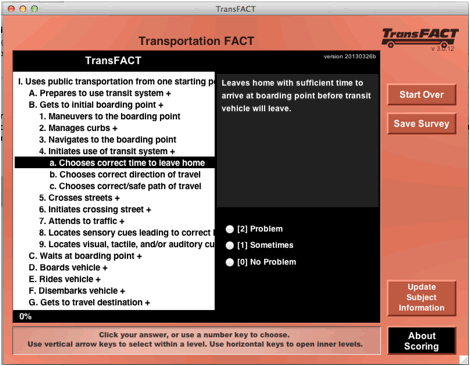A Comprehensive and Systematic Assessment of Functional Transit Skills (Cognitive, Physical, and Sensory) is needed for public transportation (US Census Bureau, Facts for Features, CB02-FF.11m July 12, 2002):
- About 15 million Americans have problems accessing needed transportation.
- About 6 million of Americans who have problems accessing needed transportation have disabling conditions.
- More than 3.5 million Americans never leave their homes.
- Over 500,000 people with disabling conditions never leave their homes.
Need for a comprehensive assessment of transit skills:
- Transportation agencies use a variety of assessments that lack consistency, reliability, and validity.
- We are aware of two published measures of transit skills that focus on specific populations and no centralized databases for comparing successes over time, assist with policy analysis, or to examine transit accessibility program strategies.
-
- The Functional Assessment of Cognitive Transit Skills (FACTS) designed for use with people with intellectual disabilities. It has good psychometric properties.
- The Transportation Skills Assessment Tool (TSAT) designed for use with people on the autism spectrum. It has no published psychometric properties.
TransFACT Computer Software Assessment:
- Intended to help transit authorities consistently and objectively determine paratransit eligibility.
- Focuses primarily on individual’s functional ability to use fixed route service.
- Takes into consideration weather and other environmental issues throughout the entire service area.
- Takes into consideration variations among disabling conditions and within one person across time.
- Identifies specific cognitive, physical, and/or sensory transit deficits.
- With these results transit agencies can provide or recommend targeted services to reduce paratransit use: Travel training, mobility management, driver cessation counseling, etc.
Below is a screenshot of the Trans-FACT taxonomy.
Figure 6: The Trans-FACT taxonomy in the xFACT platform, 4 levels of categories with response set displayed.

Bibliography
Peer reviewed publications
Crabtree, J. L., Justiss, M. D., & Troyer, J. D. (2008). Characteristics and environmental factors of paratransit applicants: A step toward understanding the person-environment dynamic and customer satisfaction. Paper presented at the Transportation Research Board (TRB) Annual Meeting, Washington, DC. https://www.semanticscholar.org/paper/Characteristics-and-Environmental-Factors-of-A-Step-Crabtree-Justiss/ba3aaae4d673733267c2084b417c14f637e7a1a0
Crabtree, J. L., Troyer, J. D., & Justiss, M. D. (2009). The intersection of driving with a disability and being a public transportation passenger with a disability. Topics in Geriatric Rehabilitation April/June, 25(2), 163-172. https://www.academia.edu/7924225/The_Intersection_of_Driving_With_a_Disability_and_Being_a_Public_Transportation_Passenger_With_a_Disability
Crabtree, J. L., & Mushi, C. (2013). Public transportation and access to food: An overlooked instrumental activity of daily living. OTJR Occupation Participation and Health 33(4):209-17. https://pubmed.ncbi.nlm.nih.gov/24652029/
Peer-reviewed presentations
Crabtree, J. L. & Fess, E. E. “Community Mobility: The Missing Link between Health and Quality of Live” International Conference on Aging, Mobility and Quality of Life, University of Michigan, 24-26 June 2012.
Crabtree, J. L. & Mushi-Brunt, C. “You Must Get Out of the Car Sometime: Community Mobility Beyond Driving–Opportunities for Innovation and Best Practice in All Practice Settings” 1.5 hours Short Course, AOTA Conference, Indianapolis, Indiana, April 2012.
Crabtree, J. L., Mushi-Brunt, C., Binion, W., Fairchild, K., Heusmann, Rachel, Schwanholt, H. “Public transportation to food access—Not a smooth ride: A secondary data analysis”. 24th Annual Midwestern Dean’s Occupational Therapy Research Conference. Saint Louis University, St Louis, MO, March 2011.
Crabtree, J. L., Justiss, M., and Fogle, C., “Public transportation as a community mobility IADL: Occupational therapy’s role”, AOTA 2007 Annual Conference April 2007.
Master’s Theses from the COMPASS Lab:
Aspy, R., Fairchild, P., Gray, D., & Paitsell-Maifert, D. (2011). Is Community mobility addressed in discharge planning? A systematic literature review. (Master’s of Science in Occupational Therapy), Indiana University, Indianapolis.
Binion, W., Fairchild, K., Heusmann, R. and Schwanholt, H. (2010). The relationship between public transportation and food access in individuals with disabilities. (Master’s of Science in Occupational Therapy), Indiana University, Indianapolis.
Boehrer, R., Braun, S., Hampton, M., & Tara R. (2012). Validation of the TransFACT Assessment: Content validity. (Master’s of Science in Occupational Therapy), Indiana University, Indianapolis, Indiana.
Buhrt, B., Graber, D., Gutierrez, H. and Hadley, E. (2009). Lived experience of paratransit transportation for persons with developmental disabilities. (Master’s of Science in Occupational Therapy), Indiana University, Indianapolis, Indiana.
Copeskey, C., Lockhart, L., Kappes, W., & Sullivan, J. (2013). Statistical Analyses of the TransFACT Assessment: Inter-rater /Intra-rater Reliability & Content/ Construct Validity. (Master’s of Science in Occupational Therapy), Indiana University, Indianapolis, Indiana.
Cardinal, T., Duff, B., Lanning, S., & Van , J. (2011). The relationship of post-stroke depression and community mobility: A systematic literature review (Master’s of Science in Occupational Therapy), Indiana University, Indianapolis, Indiana.
Ebrecht, A., Osborn, K., Schleusner, C., & Yuodzukinas, S. (2007). Characteristics and environmental factors of paratransit applicants: A descriptive study. (Master’s of Science in Occupational Therapy), Indiana University, Indianapolis, Indianapolis.
Haddan, V., Hopf, B., Kennedy, K. and Shively, A. C. (2009). Opening doors: The lived experience of older adults using paratransit. (Master’s of Science in Occupational Therapy), Indiana University, Indianapolis, Indianapolis.
Spiehler, M., Westberg, J. and Williams, M. (2008). Literature review of assessment tools of cognitive skills required for riding a fixed route bus system. (Master’s of Science in Occupational Therapy.